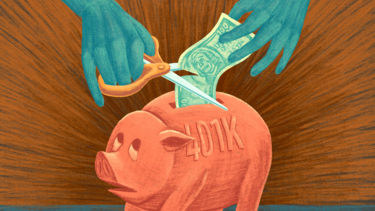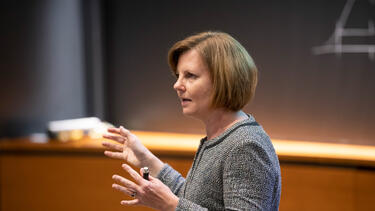Economics
When Skilled Workers Go Abroad, Their Home Countries Experience ‘Brain Gain’
When skilled workers from poorer countries migrate to wealthy ones, there are benefits for the origin countries as well as workers and the host countries, according to new research co-authored by Yale SOM’s Mushfiq Mobarak. But anti-immigrant sentiment and policy could disrupt this mutually beneficial dynamic.

Shining a Light into the Black Box of the Art Market
The opacity of the art market benefits a tiny elite of collectors, gallerists, and artists, says Yale SOM's Magnus Resch, but makes it harder for most artists and art lovers to connect.

Modeling the Path Toward Creativity
Creative insight may appear to arrive in a flash, says Yale SOM economist Jonathan Feinstein, but the eureka moment typically emerges from a foundation built over years. Feinstein’s new book modeling creativity is itself the result of an early interest and decades of exploration.

Lower-Income Employees Are More Likely to Remain at 401(k) Defaults, Even If It Costs Them Money
Automatically enrolling employees in retirement plans is a powerful tool for increasing savings. But Yale SOM’s James Choi and his coauthors find that once enrolled, people with lower incomes are more likely to remain at default contribution rates, even if they aren’t optimal.

The Conversations on an Anonymous Economics Forum Are Troubling—and Elite Schools Are Part of the Problem
Yale SOM’s Paul Goldsmith-Pinkham and Kyle Jensen and their former colleague Florian Ederer presented a study showing that anonymous racist and sexist posts on the popular Economics Job Market Rumors website were coming from top universities.

Video: Dating, Marriage, Parenting, and the Gender Wage Gap
Women earn 79 cents for every dollar that men make. But look beyond that widely cited statistic, and you’ll find a complex story of causes, effects, and correlations. Prof. Mushfiq Mobarak surveys the literature on the subject and argues that, to close the gap, we need to address society’s differing expectations around who bears the burden of family and parenting responsibilities.

Bringing the Economist’s Tool Kit to the Policies that Shape Markets
Katja Seim, the Sharon Oster Professor of Economics and Management, investigates the complex forces behind the infrastructure of everyday life with an aim of enabling data-driven improvement to policy tools and making markets function better.

Is Dynamic Airline Pricing Costing Us?
Prices for airline tickets rise and fall depending on demand. Yale SOM’s Aniko Öry and Kevin Williams investigated whether such pricing makes airlines and customers better off.

R&D Investment Can Have Multiplier Effects—If It’s Made in the Right Industries
A new study co-authored by Prof. Song Ma finds that allocating research funding to certain scientific fields can have long-term ripple effects across sectors and countries.

The End of Noncompete Agreements May Be Near
Earlier this month, the Federal Trade Commission unveiled a proposal that would block companies from limiting their employees’ ability to work for a rival through noncompete agreements. We asked Yale SOM’s Fiona Scott Morton about the ban’s potential impact on wages, innovation, and the economy as a whole.

Will the Fed Keep Raising Rates?
We asked Prof. William English, a former Fed official, to interpret the announcements at the Federal Open Market Committee’s monthly meeting last week.
